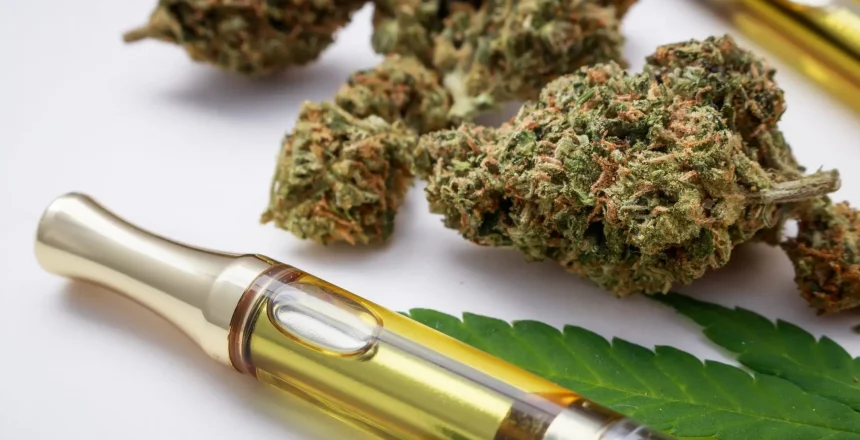Introduction
THC-P, short for tetrahydrocannabiphorol, is a synthetic cannabinoid that has been gaining attention in the cannabis industry for its unique properties and potential benefits. THC-P products offer an alternative to traditional cannabis products, providing users with the potential for more potent effects at lower doses. In this comprehensive guide, we will explore the potential benefits of THC-P products, based on existing research and anecdotal evidence. However, it’s important to note that THC-P is a relatively new and understudied compound, and more research is needed to fully understand its effects on the human body.
Enhanced Potency
One of the primary benefits of THC-P products is their reported enhanced potency compared to natural THC. Some users claim that THC-P is up to 30 times more potent than traditional THC, meaning that smaller doses may produce more significant effects. This increased potency could be appealing to individuals seeking a more intense experience or those with a higher tolerance to traditional cannabis products.
Potential for Lower Dosage
Due to the higher potency of THC-P, users may require smaller doses to achieve their desired effects. This can be advantageous for those who are sensitive to THC or wish to consume cannabis more conservatively. Lower dosages also reduce the risk of overconsumption and potential adverse reactions, making THC-P products an appealing option for those looking for a more controlled and manageable experience.
Altered Sensory Perception
THC-P products are reported to induce altered sensory perception, leading to enhanced colors, sounds, and tastes. This phenomenon can be intriguing for some users who appreciate the unique and novel effects of THC-P. However, it is essential to approach these altered perceptions with caution, as they may be disorienting or overwhelming for some individuals.
Potential Medical Applications
While research on THC-P is still in its infancy, there is growing interest in the potential medical applications of this synthetic cannabinoid. Like natural cannabinoids, THC-P may interact with the endocannabinoid system, which plays a crucial role in regulating various physiological processes. Some studies suggest that certain synthetic cannabinoids, including THC-P, could possess therapeutic properties, such as pain relief, anti-inflammatory effects, and antiemetic (anti-nausea) properties. However, more research is needed to validate these potential medical benefits and establish safe and effective dosage guidelines.
Anxiety and Stress Relief
Anecdotal reports from some users suggest that THC-P products may offer relief from anxiety and stress. However, it is important to note that the effects of THC-P can vary significantly among individuals, and not everyone may experience anxiety relief. Furthermore, excessive consumption of THC-P or any cannabis product may exacerbate anxiety in certain individuals, so moderation and responsible use are essential.
Sleep Aid
Another potential benefit of THC-P products is their reported ability to aid in sleep. Some users claim that THC-P helps them relax and fall asleep more easily. However, it’s crucial to exercise caution with using THC-P as a sleep aid, as excessive consumption or dependence on cannabinoids for sleep may lead to undesirable effects in the long run.
Appetite Stimulation
THC-P, like THC, is known for its potential to stimulate appetite. This effect, commonly referred to as the “munchies,” can be beneficial for individuals who struggle with a lack of appetite due to medical conditions or treatments. However, for some individuals, excessive appetite stimulation may not be desirable, so it’s essential to consume THC-P products mindfully.
Exploration of New Cannabis Experiences
For cannabis enthusiasts seeking novel experiences, THC-P products can provide a fresh and exciting way to explore the effects of cannabinoids. The altered potency and unique effects of THC-P may appeal to those who have become accustomed to traditional THC strains and are interested in branching out.
Potential for Microdosing
Due to its higher potency, THC-P may be well-suited for microdosing, which involves consuming minimal amounts of a substance to experience subtle effects without intoxication. Microdosing THC-P could allow users to reap potential therapeutic benefits without experiencing overwhelming psychoactive effects, making it an attractive option for those who need symptom relief without impairment.
Discreet Consumption
Like other edible cannabis products, THC-P gummies and other infused products offer discreet consumption options. This can be particularly advantageous for individuals who wish to enjoy the effects of THC-P without the stigma or attention associated with smoking or vaping cannabis.
The Emergence of THC-P Products
The cannabis industry has witnessed a steady evolution, with various cannabinoids and products continuously being explored and developed. THC-P is one such example of a synthetic cannabinoid that has emerged as a potential game-changer in the market. Researchers and cannabis enthusiasts have taken a keen interest in THC-P due to its reported heightened potency compared to natural THC. As the demand for novel and more potent cannabis experiences increases, THC-P products have garnered attention for their unique properties and potential benefits.
THC-P vs. Natural THC
THC-P’s chemical structure closely resembles that of traditional THC, the primary psychoactive compound found in natural cannabis. However, THC-P boasts an extra pentyl side chain, which is believed to contribute to its enhanced potency. This alteration in structure potentially allows THC-P to bind more tightly to cannabinoid receptors in the endocannabinoid system, leading to stronger effects at lower doses. The distinction between THC-P and natural THC is a point of interest for researchers, as it could shed light on how cannabinoids interact with the body’s endocannabinoid system and offer new insights into cannabinoid pharmacology.
Understanding the Endocannabinoid System
The endocannabinoid system (ECS) is a complex network of receptors, endocannabinoids, and enzymes that play a vital role in regulating various physiological processes within the body. Cannabinoid receptors, known as CB1 and CB2 receptors, are found throughout the central nervous system, peripheral organs, and immune cells. When activated by cannabinoids like THC or THC-P, these receptors modulate neurotransmitter release and influence functions such as pain perception, mood regulation, appetite, and immune response. Understanding how THC-P interacts with the ECS is crucial in comprehending its potential benefits and effects on the human body.
Research and Limited Studies
While THC-P’s potential benefits are intriguing, it’s essential to recognize that research on this synthetic cannabinoid is still in its infancy. Most of the information available about THC-P comes from limited studies and anecdotal reports from users. Further research is needed to fully comprehend the safety, efficacy, and long-term effects of THC-P products. Clinical trials and controlled studies are essential to establish concrete evidence regarding its potential medical applications and to determine any potential risks associated with its use.
Variety of THC-P Products
As THC-P gains popularity, cannabis companies have begun to produce an array of products that incorporate this synthetic cannabinoid. THC-P gummies, in particular, have become a sought-after option for consumers seeking a discreet and convenient method of consuming THC-P. Additionally, THC-P tinctures, vapes, and capsules are becoming more prevalent in the market. This variety of products allows consumers to choose the method that best suits their preferences and desired experience.
Risks and Safety Considerations
While THC-P products offer unique benefits, it’s essential to acknowledge potential risks associated with their use. The increased potency of THC-P can lead to more intense psychoactive effects, potentially causing discomfort or anxiety for some users. Overconsumption of THC-P may also result in adverse reactions, and the long-term effects of regular use are not yet fully understood. Furthermore, the lack of standardized regulations and quality control in the cannabis industry raises concerns about product consistency and potential contaminants. Consumers must be vigilant and seek products from reputable sources to ensure safety and product integrity.
The Influence of Terpenes
Terpenes are aromatic compounds found in cannabis and other plants that contribute to the plant’s distinct flavors and aromas. They also play a role in the entourage effect, where cannabinoids and terpenes work together synergistically to enhance the overall effects of cannabis. Some THC-P products may include specific terpenes to mimic the flavors and experiences associated with different strains of natural cannabis. Understanding the interplay between THC-P and terpenes can provide consumers with a more tailored and enjoyable experience.
Conclusion
THC-P products present a promising addition to the cannabis industry, offering enhanced potency and potential benefits for users seeking novel experiences and potential therapeutic effects. However, it’s essential to approach THC-P with caution, as it is a synthetic cannabinoid with limited research on its long-term effects. As with any cannabis product, responsible use, adherence to dosage guidelines, and awareness of individual tolerance levels are vital to ensuring a safe and enjoyable experience with THC-P products. As research on THC-P continues to evolve, we can anticipate a more comprehensive understanding of its benefits and potential applications in the realm of cannabis and medicine.
I presently work as a GP in London. Using the acquired academic and professional experience, I advise patients with various complaints about mental health – depressed mood, nervousness, lack of energy and interest, sleep disorders, panic attacks, obsessive thoughts and anxieties, difficulty concentrating, and stress. In my free time, I love to paint and go on long walks on the beach. One of my latest obsessions is sudoku – a wonderful activity to calm an unease mind.
[email protected]
- Lip Fillers, Botox, Dermal Fillers, Anti-Wrinkle Injections in Aldgate East E1 - March 21, 2024
- Can You Travel With CBD Gummies - August 5, 2023
- Can CBD Gummies Get You High? - August 5, 2023




